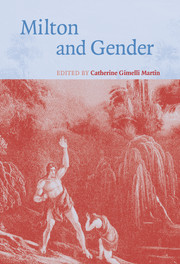Book contents
- Frontmatter
- Contents
- List of illustrations
- Notes on contributors
- Acknowledgments
- Abbreviations
- Introduction: Milton's gendered subjects
- PART I MASCULINITY, DIVORCE, AND MISOGYNY IN MILTON'S PROSE
- PART II THE GENDERED SUBJECTS OF MILTON'S MAJOR POEMS
- 4 The profession of virginity in A Maske Presented at Ludlow Castle
- 5 The genders of God and the redemption of the flesh in Paradise Lost
- 6 Transported touch: the fruit of marriage in Paradise Lost
- 7 The experience of defeat: Milton and some female contemporaries
- 8 Samson and surrogacy
- 9 “I was his nursling once”: nation, lactation, and the Hebraic in Samson Agonistes
- 10 “The Jewish Question” and “The Woman Question” in Samson Agonistes: gender, religion, and nation
- PART III GENDERED SUBJECTIVITY IN MILTON'S LITERARY HISTORY
- Index
5 - The genders of God and the redemption of the flesh in Paradise Lost
Published online by Cambridge University Press: 22 September 2009
- Frontmatter
- Contents
- List of illustrations
- Notes on contributors
- Acknowledgments
- Abbreviations
- Introduction: Milton's gendered subjects
- PART I MASCULINITY, DIVORCE, AND MISOGYNY IN MILTON'S PROSE
- PART II THE GENDERED SUBJECTS OF MILTON'S MAJOR POEMS
- 4 The profession of virginity in A Maske Presented at Ludlow Castle
- 5 The genders of God and the redemption of the flesh in Paradise Lost
- 6 Transported touch: the fruit of marriage in Paradise Lost
- 7 The experience of defeat: Milton and some female contemporaries
- 8 Samson and surrogacy
- 9 “I was his nursling once”: nation, lactation, and the Hebraic in Samson Agonistes
- 10 “The Jewish Question” and “The Woman Question” in Samson Agonistes: gender, religion, and nation
- PART III GENDERED SUBJECTIVITY IN MILTON'S LITERARY HISTORY
- Index
Summary
Why are there essents rather than nothing? … The range of this question finds its limit only in nothing, in that which simply is not and never was. Everything that is not nothing is covered by this question, and ultimately even nothing itself; not because it is something, since after all we speak of it, but because it is nothing. Our question reaches out so far that we can never go any further.
I placed a jar in Tennessee …
WHAT DOES GOD WANT?
In the beginning “God is All in All,” yet, when Satan crosses the abyss at the end of the second book of Paradise Lost, he encounters Chaos and Old Night, subsisting as gendered entities:
the throne
Of Chaos, and his dark pavilion spread
Wide on the wasteful deep; with him enthroned
Sat sable-vested Night, eldest of things,
The consort of his reign.
(PL 2.959–63)Apart from a cautious dubiety about the veracity of Satan's experience, a reader is entitled to register surprise at the quasi-allegorical ontology of these characters, to be curious about the import of their genders and to be confused about the notion that Night is “eldest of things,” in view of the invocation to light that opens book 3:
Hail holy Light, offspring of Heav'n first-born,
Or of th' Eternal co-eternal beam
May I express thee unblamed? Since God is light,
And never but in unapproached light
Dwelt from eternity, dwelt then in thee,
Bright effluence of bright essence increate.
(PL 3.1–6)- Type
- Chapter
- Information
- Milton and Gender , pp. 95 - 114Publisher: Cambridge University PressPrint publication year: 2005

